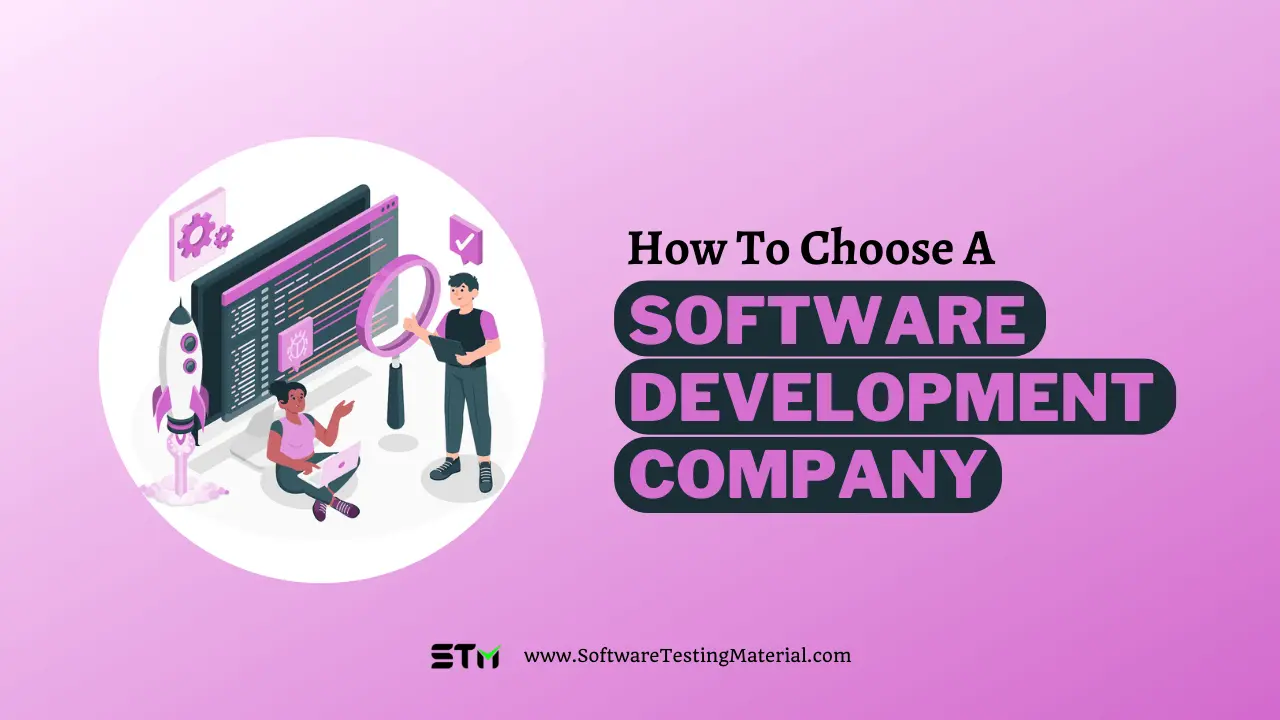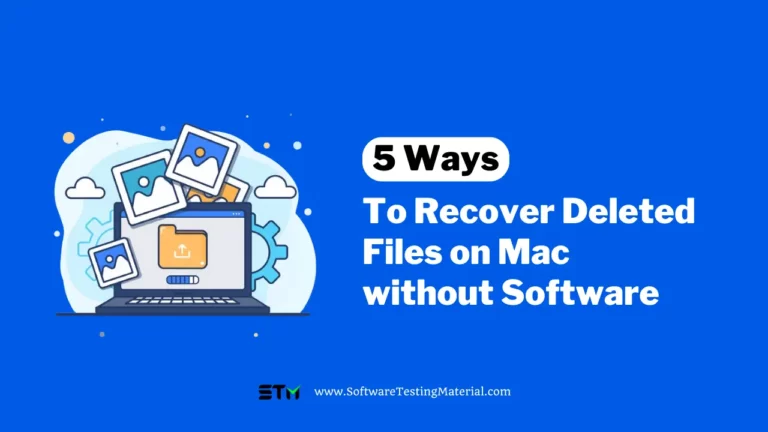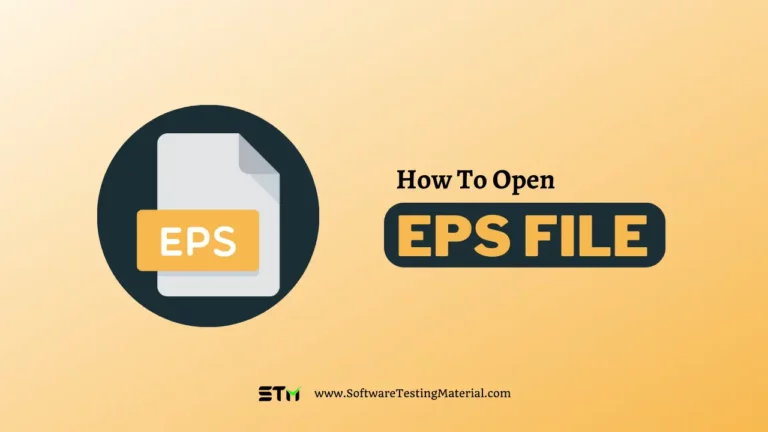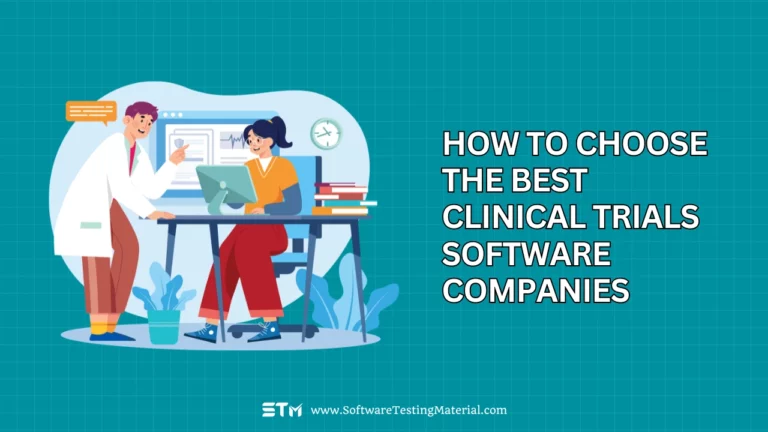How To Choose a Software Development Company
Are you in a search on how to choose a software development company?
The distinction between a good and terrible software development partner can sometimes be razor-thin; the variations are in mentality (and team), competence, and method.
One of the most crucial decisions you’ll have to make while building your digital empire is settling on the finest software development company. Do you need help choosing the best software development firm for your project? Knowing which choice to select might be challenging with so many possibilities accessible. But don’t worry; this post examines what makes a successful software company.

Factors to Consider When Choosing a Software Development Company
We’ll look at crucial aspects that might make or break your software development journey, guiding you confidently and clearly through the maze of alternatives. Join us as we investigate the key factors when hiring a software development business.
Define Your Software Development Needs
Define your project’s requirements and expectations before beginning your search. Consider the sort of app you want to create, whether starting from scratch or requiring an extension, your current responsibilities and tech stack, and your budget.
Then you should conduct some research. Visit sites like Clutch, Techreviewer, and Google for dependable client feedback. Consider favorable and unfavorable evaluations to acquire a whole company picture.
Experience and Expertise
When choosing a software development company, the experience and expertise of the industry are essential. Investigate the company’s track records to measure its success. They should inquire about the specifics of their expertise. With which industries, technology, and product aspects have they collaborated? Information about technologies is critical because organizations often use a few coding languages. A corporate blog is another valuable source of information about the team’s experience with specific technologies.
Portfolio and Case Studies
Examining a company’s portfolio and case studies can provide valuable information about its skills and work quality. Examine their previous work to ascertain their level of skill. Examine similar-sized and-complexity projects and evaluate the user experience, functionality, and overall design. This will indicate their abilities and allow you to determine whether their work fits your requirements.
Client Reviews and Testimonials
Analyzing client evaluations and testimonials is an excellent way to determine a company’s trustworthiness and customer satisfaction. Read customer reviews to have a better idea of their experiences. Leading software businesses are also ideal partners. Look up the finest tech conferences and check what firms are exhibiting to identify these companies. You might also contact software businesses with industry awards or high certifications.
Expertise comes in a variety of kinds and sizes. Nonetheless, noteworthy tech leaders may be lecturing at workshops or webinars, developing open-source tools, writing professional guides, or running programs at prominent institutions. New growing talent may also be found at coding competitions and software conferences.
This will give you a good idea of their commitment to customer satisfaction.
Communication and Collaboration
Effective communication and cooperation are required for a successful software development project. Choose a company that stresses clear and timely communication and transparent project management. When things go rough, you’ll want a software development partner who communicates clearly to keep you updated — rather than ignoring the matter or ghosting you. Experience conveying the good, bad, and ugly is critical to project success. You should inquire how the software business handles communication, mainly when issues develop. Forming solid alliances and offering cross-functional teams with Business Analysts and Project Managers is critical.
Development Process and Procedures
It is critical to understand the company’s development process and procedures. Inquire about their preferred approaches, such as Agile or Scrum, and how they correspond to your project. Discuss their project planning, iteration, and quality assurance methods. You should search for the required specialty and a good knowledge of how the technologies will interact.
Software firms should specify the tech stack they feel is ideal for your project and validate compatibility with your existing systems. You should investigate these future technologies to grasp their benefits and drawbacks properly. This prevents you from selecting a tech stack only to discover that specific capabilities you desired, later on aren’t accessible.
A well-defined development process ensures transparency, effective project management, and timely milestone delivery.
Technical Support and Maintenance
Post-development support and maintenance are critical for the long-term viability of your program. Inquire about the technical support and maintenance services provided by the organization. Understand their methods for resolving difficulties, delivering updates, and ensuring your software runs well. Choose a business that offers dependable technical help to fix any potential faults or challenges that may arise after deployment as soon as possible.
Security and Confidentiality
Data security and confidentiality are non-negotiable features of software development. Inquire about the security measures organizations use, such as encryption techniques, access restrictions, and access restrictions. Discuss their dedication to safeguarding sensitive information and intellectual property. Here’s a rundown of the most important:
- Non-Disclosure Agreement (NDA) – will safeguard your company’s trade secrets and private information.
- Data access – You don’t have to offer developers working on your project access to the entire database; you may share an anonymized portion in the local copy. This provides you control over which data is collected.
- Server access – To limit data access, only chosen personnel should have access to servers to perform critical maintenance tasks (such as upgrading the program and database).
- Non-Compete Agreement (NCA) – This agreement prohibits the outsourced firm from disclosing its ideas/innovations to rivals. The notion is that you, as an agency or developer, cannot collaborate with a prospective competitor of your client for the agreed-upon period.
- API access – If an API is built, your partner can connect to the ready-made section of the secure program and consider it a black box without requiring access to sensitive code.SSL Certificates – Use secure SSL certificates to verify your outsourced developers.
Process of final evaluation and decision-making
Create a final evaluation checklist summarizing the major elements addressed throughout the blog. Assess each possible software development business using predefined criteria, such as expertise, portfolio, client evaluations, communication, development process, support, budget alignment, and security measures.
Choosing and Evaluating the Best Software Development Company
Research and Selection
Thorough research to generate a shortlist of qualified software development organizations benefits your company’s success. Reading reviews, testimonials, and case studies gives you insight into their reputation and prior client experiences. Obtaining suggestions and referrals from trusted sources establishes their credibility and helps identify dependable solutions.
Requesting Proposals and Choosing the Best Option
Requesting quotes from the companies you’ve found allows you to evaluate their suitability for your project. Their understanding of your needs, recommended procedure, estimated timelines, and pricing are all key factors to consider. Making a wise decision necessitates how well each business matches your project requirements regarding technical expertise, communication, and project management practices.
The Importance of Long-Term Collaboration and Support
A long-term partnership with a software development company goes beyond the initial project. A reliable partner knows your company’s objectives, industry landscape, and trends. They provide ongoing support, maintenance, and upgrades to ensure the longevity and scalability of your software system.
Your software solution’s frequent updates, security patches, and feature additions keep it current and in line with your changing company needs.
A dependable partner can assist with future efforts, leveraging their talents and knowledge to add value to your organization. Before choosing one, examine a software development company’s commitment to long-term collaboration and the assistance it can provide beyond the original development period.
Wrapping up
When selecting a software development business, evaluating various elements that affect your project’s success is critical. Following these essential elements will allow you to choose a software development company that meets your demands and ambitions.
Examine the company’s experience, competence, and portfolio when you choose a software development company, to confirm its project completion track record. Choose a firm that appreciates openness and has a well-defined development process if effective communication and cooperation are essential.
Review the technical expertise and team makeup to ensure they have the necessary skills and knowledge for your project. A good collaboration is also influenced by cultural fit and similar values. Examine whether their work culture is compatible with yours since this will promote a peaceful and productive partnership.
By considering these criteria and putting them into your decision-making process for picking a software development business, you can locate a dependable and competent partner who satisfies your technical needs and understands your vision and goals. You may go on a revolutionary path of digital innovation with the proper software development firm by your side and achieve the success you desire for your business.






